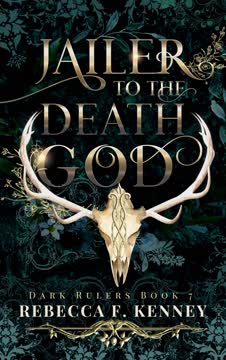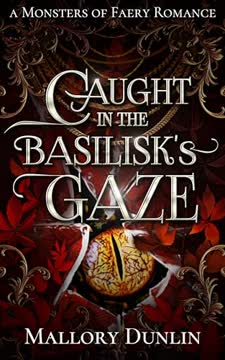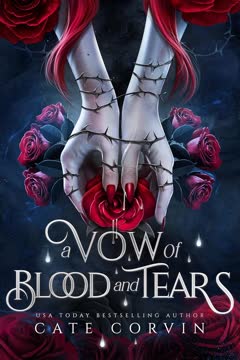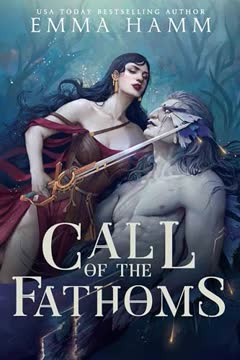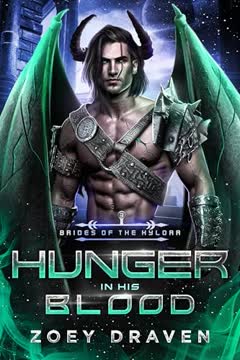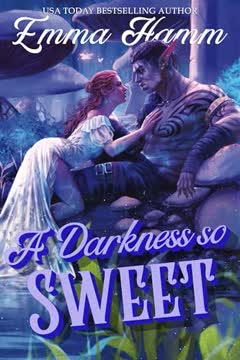Plot Summary
Plague's Relentless Toll
Cerato is dying. The plague has claimed the Queen's family, friends, and most of her people. Vale, newly crowned and herself a survivor, is haunted by loss and the futility of her efforts. Her closest friends, Rose and Leilani, are dying or dead. The palace is a mausoleum of grief, and hope is a brittle thing. Vale's sense of duty wars with her despair as she watches her world unravel. The winter's cold only deepens the sense of isolation and helplessness. The Queen's heart is battered by survivor's guilt, and she is forced to consider desperate measures as the last of her loved ones slip away. The kingdom's future hangs by a thread, and the Queen's resolve is all that remains.
Desperate Summoning Pact
Driven to the edge by loss, Vale and Rose discover an ancient ritual to summon Arawn, the god of death. The spell demands nine willing sacrifices, a price almost too terrible to bear. Leilani, dying and lucid, offers herself, and others in the palace, already doomed by the plague, agree to join her. The Queen's heart is torn as she prepares to kill her friends for a chance at salvation. The ritual is performed at the edge of Arawn's Pit, a place of ancient dread. Each death is a wound on Vale's soul, but she steels herself, believing that only a god's intervention can save her people. The act is both a mercy and a horror, and the Queen's hands are forever stained.
Death God's Arrival
Arawn is wrenched from his realm by the ritual, forced into the mortal world by the power of nine willing deaths. He is furious, disdainful, and bound to Vale's will for a year. The Queen, exhausted and desperate, bargains for her people's lives. Arawn is compelled to spare the worthy from the plague, but he is not merciful—he judges each soul. The chains of the ritual make him more human, vulnerable to sensation and emotion. The Queen's grief and defiance intrigue him, and their fates are now entwined. The god's presence is both a blessing and a curse, and the kingdom's hope is now tied to a dangerous, ancient being.
Bargain of Sacrifice
Vale and Arawn return to the palace, where the god's presence must be concealed. Arawn's powers are limited by the ritual's chains, and he is forced to experience hunger, cold, and desire. The Queen's grief is raw, and Arawn is both repulsed and fascinated by her pain. Their relationship is antagonistic, laced with reluctant respect and growing attraction. The Queen's council is restless, and political threats loom. Arawn's first act is to spare Rose's dying sisters, marking them with his power. The Queen's sacrifice is not only of blood, but of her own heart, as she must live with the consequences of her desperate bargain.
First Lives Spared
Arawn begins his work, sparing the worthy from death but refusing to heal or show mercy to the unworthy. The Queen witnesses the limits of divine intervention—Arawn's power is not a cure, but a reprieve. The people's reactions are mixed: some see miracles, others see cruelty. The Queen's grief is compounded by the knowledge that not all can be saved. Arawn's presence in the palace is a secret, but rumors begin to spread. The Queen's resolve is tested as she navigates the demands of rulership, the needs of her people, and the unpredictable nature of her captive god.
Palace of Grief
The palace is a place of mourning, but also of new, strange intimacy. Vale and Arawn are forced into close quarters, their antagonism giving way to moments of vulnerability. The Queen's nightmares and Arawn's unfamiliar sensations draw them together. The god's chains tighten with every act of service, and he finds himself both resenting and craving the Queen's presence. The Queen, in turn, is drawn to Arawn's power and otherness, even as she fears what he represents. Their connection deepens, blurring the lines between captor and captive, ruler and god.
Chains and Carnality
The forced proximity and emotional intensity between Vale and Arawn ignite a physical attraction neither can deny. Their first sexual encounter is raw, desperate, and transformative, offering both relief and new complications. Arawn's inexperience and Vale's hunger for sensation create a bond that is both carnal and emotional. The god's chains are eased by pleasure, and the Queen finds solace in his arms. Yet both know that their connection is dangerous, threatening the fragile balance of power and the fate of the kingdom.
Queen and God Entwined
As Vale and Arawn travel the kingdom, healing and judging, their relationship deepens. The Queen's political enemies grow bolder, and the people's adulation of Arawn increases his power. The god's vulnerability to human sensation makes him more empathetic, while the Queen's loneliness finds comfort in his presence. Their love becomes a source of strength and a potential curse, as the terms of the ritual threaten dire consequences if Arawn falls in love. Together, they face the challenges of rulership, desire, and the ever-present shadow of death.
Council's Political Threats
The Queen's council, led by the ambitious Lord Venniroth, seeks to control her through forced marriage. Political intrigue intensifies as the council threatens to depose Vale if she does not choose a consort. The Queen, desperate to maintain her autonomy and protect Arawn, proposes marriage to the god himself. Their union is both a political maneuver and a declaration of love, defying tradition and the council's machinations. The wedding, held in the temple of Beirgid, is a spectacle of defiance, passion, and risk.
Healing and Hatred
The Queen and Arawn's marriage brings new challenges. The council's resentment festers, and Lord Venniroth plots in the shadows. Arawn's growing love for Vale threatens the terms of his bondage, risking the loss of his realm. The god's enemies, both mortal and divine, close in. Macha, the goddess of war, reveals her hand, manipulating events to her own ends. The Queen's life is in constant danger, and Arawn's power is tested as he struggles to protect her and fulfill his bargain.
City on the Brink
The city teeters on the edge of chaos as the people's fear and anger boil over. Arawn's true nature is revealed to the public in a moment of crisis, and the Queen's leadership is put to the ultimate test. Together, they quell the riot, but the cost is high. The Queen's vulnerability is exposed, and Arawn's love for her deepens, even as it threatens his existence. The kingdom's fate hangs in the balance, and the couple's bond is both a source of hope and a looming threat.
Riot and Revelation
The Queen's enemies strike, and betrayal comes from within. Lord Venniroth's assassination attempt nearly succeeds, and Vale is gravely wounded. Arawn's desperation leads him to bargain with Macha, offering himself in exchange for Vale's life. The goddess's cruelty is revealed, and the true cost of love becomes clear. Vale, refusing to surrender, uses the godsblood dagger to destroy Macha, breaking the curse and freeing Arawn. The act is both a triumph and a tragedy, as the Queen's life hangs by a thread.
Shadows in the Garden
With Macha destroyed, the spell binding Arawn is broken. The Queen is saved by the combined efforts of Arawn and her loyal healer, Tilda. The kingdom is freed from the threat of divine vengeance, and Arawn's power is restored. The couple's love, once a source of danger, becomes a beacon of hope. The people of Cerato embrace their god-king and queen, and the future is brightened by the promise of renewal and peace.
Hounds of Unlife
Arawn's past haunts him as the hounds of Unlife rebel, manipulated by Macha's lingering influence. The god's struggle to maintain control of his realm mirrors the Queen's battle to secure her throne. Together, they face the dangers of both worlds, forging a partnership that is stronger than either alone. The defeat of the hounds marks a turning point, as Arawn embraces his new role as protector and partner, and the Queen finds strength in love and leadership.
Macha's Deadly Game
Macha's true motives are revealed—her vendetta against Vale's stepmother, her desire for Arawn's throne, and her willingness to destroy everything for revenge. The Queen's courage and Arawn's defiance culminate in a final confrontation. The god's newfound power, fueled by the worship of the people and his love for Vale, enables him to banish Macha and secure his realm. The victory is hard-won, and the cost is high, but hope is restored.
Wedding of Defiance
The Queen and Arawn's marriage, once a political necessity, becomes a symbol of defiance and renewal. Their love, tested by trials and betrayals, emerges stronger. The kingdom celebrates their union, and the people's faith in their rulers is restored. The couple's partnership is both a personal triumph and a political victory, uniting mortal and divine in a new era for Cerato.
Love's Dangerous Consequence
The breaking of Macha's spell frees Arawn, but the consequences of love remain. The god's willingness to sacrifice everything for Vale is both his greatest strength and his greatest vulnerability. Together, they face the future, knowing that their love has changed the world—and themselves—forever. The kingdom is reborn, and the couple's bond is a beacon of hope in a world once ruled by death.
Betrayal and Bloodshed
The final threats to the Queen's life are vanquished. Lord Venniroth's treachery is revealed and punished, and the council is brought to heel. The kingdom's wounds begin to heal, and the people look to the future with hope. The Queen and Arawn, united in love and purpose, lead Cerato into a new era of peace and prosperity.
Death's Bargain Broken
With the curse lifted and the kingdom saved, Arawn and Vale look to the future. The god's power is secure, and the Queen's rule is unchallenged. Together, they rebuild Cerato, honoring the sacrifices of the past and embracing the promise of tomorrow. Their love, once a source of peril, is now the foundation of a new world.
Hope's Immortal Gift
On the anniversary of their meeting, Arawn gives Vale the greatest gift: the return of her loved ones as lesser deities, and a tethermark granting her youth and health for as long as he exists. The couple, now immortal partners, look to a future of adventure and discovery, their love a beacon for Cerato and beyond. The kingdom, once ravaged by death, is reborn in hope, and the Queen and her god-king reign together, forever entwined.
Characters
Vale, Queen of Cerato
Vale is a young queen shaped by relentless loss and the crushing weight of responsibility. Her survival of the plague marks her physically and emotionally, leaving her with white hair and a heart scarred by grief. She is fiercely loyal, willing to sacrifice everything—including her own soul and the lives of her friends—for her people. Vale's psychological journey is one of transformation: from despairing survivor to courageous ruler, from isolated mourner to passionate lover. Her relationship with Arawn is complex—antagonistic, tender, and ultimately redemptive. Through love, she finds hope and the strength to defy fate, becoming a symbol of resilience and renewal for her kingdom.
Arawn, God of Death
Arawn is an ancient, enigmatic deity, lord of the Unlife, and judge of souls. Summoned and bound by Vale's ritual, he is forced into a year of servitude, experiencing human sensation and emotion for the first time. Initially disdainful and wrathful, Arawn is gradually changed by his proximity to mortal suffering and love. His psychological arc is one of awakening: from detached judge to vulnerable lover, from vengeful god to devoted partner. The chains of the ritual make him more human, and his love for Vale becomes both his greatest weakness and his salvation. Arawn's struggle with his own nature, his enemies, and the consequences of love drive the story's emotional core.
Rose
Rose is Vale's childhood companion, marked by the plague and by her unwavering devotion. Her willingness to die for her sisters and her kingdom is a testament to her courage and love. Rose's death is a pivotal moment, catalyzing the summoning of Arawn and shaping Vale's journey. In the end, she is rewarded with a place among the new deities of Annwn, her sacrifice honored and her spirit restored.
Leilani
Leilani, another of Vale's closest friends, is a victim of the plague who chooses to offer herself as a sacrifice. Her love for her partner, Thistle, and her selfless acceptance of death are emblematic of the story's themes of love and loss. Leilani's memory haunts Vale, and her return as a lesser deity is a symbol of hope and redemption.
Lord Venniroth
Venniroth is the chief political antagonist, seeking to control Vale through forced marriage and, ultimately, assassination. His psychological profile is one of entitlement, resentment, and predatory desire. His downfall is both poetic justice and a warning against unchecked ambition. Venniroth's actions catalyze the story's climactic betrayals and bloodshed.
Macha
Macha, the goddess of war, is the story's divine antagonist. Her vendetta against Vale's stepmother and her desire for Arawn's throne drive much of the plot's conflict. Macha is psychologically hollow, her cruelty born of ancient wounds and a desperate need for meaning. Her manipulation of mortals and gods alike is both terrifying and pitiable. Her destruction at Vale's hand is the story's turning point, breaking the curse and freeing Arawn.
Tilda
Tilda is a quiet presence in the palace, her true power concealed until the story's climax. Her loyalty to Vale and her willingness to risk herself for the Queen's life are emblematic of the story's themes of hidden strength and selfless service. Tilda's healing magic, though weak, is crucial in saving Vale and breaking Macha's hold.
Farley
Farley is the Queen's carriage driver and a survivor of the plague. His loyalty, humor, and adaptability make him a valuable ally. Farley's presence provides moments of levity and humanity amid the story's darkness.
Emitt
Emitt is a young healer whose power is crucial in saving Vale's life. His innocence, courage, and compassion represent the story's hope for renewal and the next generation. Emitt's tethermark ensures his safety and the continuation of healing in Cerato.
The Council
The council members, led by Venniroth, represent the forces of tradition, suspicion, and resistance to change. Their psychological profiles range from self-serving to genuinely concerned, and their actions drive much of the story's political tension. The council's eventual acceptance of Arawn and Vale's rule marks the kingdom's transformation.
Plot Devices
Ritual Sacrifice and Divine Binding
The story's inciting device is the ancient ritual requiring nine willing sacrifices to summon and bind the god of death. This act of ultimate desperation sets the tone for the narrative, establishing the stakes and the moral ambiguity of Vale's choices. The ritual's consequences—Arawn's servitude, the chains that make him vulnerable, and the year-long contract—drive the plot's central conflicts. The device is both literal and symbolic, representing the cost of hope and the dangers of seeking salvation through forbidden means.
Incarnation and Humanization of the Divine
Arawn's forced incarnation is a key narrative structure, allowing for the exploration of power, vulnerability, and transformation. The god's gradual humanization—through sensation, emotion, and love—mirrors the Queen's journey from despair to hope. The device enables the story's central romance and the exploration of themes of mortality, sacrifice, and redemption.
Political Intrigue and Forced Marriage
The council's attempts to control Vale through marriage and political maneuvering provide a human counterpoint to the divine conflict. The forced marriage plot device raises the stakes, tests the Queen's resolve, and catalyzes her union with Arawn. The interplay of political and supernatural threats creates a layered, suspenseful narrative.
Divine Antagonism and Curses
Macha's manipulation, the curse binding Arawn, and the threat of divine retribution create a sense of cosmic peril. The story uses foreshadowing—Macha's schemes, the godsblood dagger, the consequences of love—to build tension and drive the plot toward its climactic confrontation. The breaking of the curse and the destruction of Macha are both literal and metaphorical victories.
Resurrection and Immortal Gifts
The story's resolution hinges on the power of love, worship, and sacrifice. Arawn's ability to return Vale's loved ones as lesser deities, and the granting of a tethermark for eternal youth and health, are narrative devices that reward the characters' suffering and growth. The ending is both a restoration and a transformation, offering hope and renewal for the kingdom and its rulers.
Analysis
Rebecca F. Kenney's Jailer to the Death God is a dark, romantic fantasy that explores the intersection of mortality, power, and love in a world ravaged by plague and divine indifference. At its heart, the novel is a meditation on the cost of hope and the redemptive power of sacrifice. The Queen's journey—from despairing survivor to courageous ruler, from isolated mourner to passionate lover—mirrors the kingdom's transformation from death to renewal. Arawn's forced incarnation and gradual humanization challenge the boundaries between god and mortal, exploring themes of vulnerability, empathy, and the dangers of love. The story's use of ritual, political intrigue, and divine antagonism creates a rich tapestry of conflict and consequence. Ultimately, the novel suggests that true power lies not in domination or vengeance, but in compassion, partnership, and the willingness to risk everything for those we love. The ending, with its restoration of lost loved ones and the promise of immortal partnership, is both a reward for suffering and a vision of hope for a world once ruled by death.
Last updated:
Review Summary
Jailer to the Death God receives mostly positive reviews, with readers praising its captivating storyline, well-developed characters, and emotional depth. Many appreciate the unique take on the enemies-to-lovers trope and the virgin hero concept. The book's dark themes, including plague and grief, are balanced with moments of humor and romance. Some readers critique the pacing and predictability of certain plot elements. Overall, the novel is commended for its world-building, spicy scenes, and the compelling relationship between Vale and Arawn.
Dark Rulers Series
Similar Books
Download PDF
Download EPUB
.epub digital book format is ideal for reading ebooks on phones, tablets, and e-readers.
